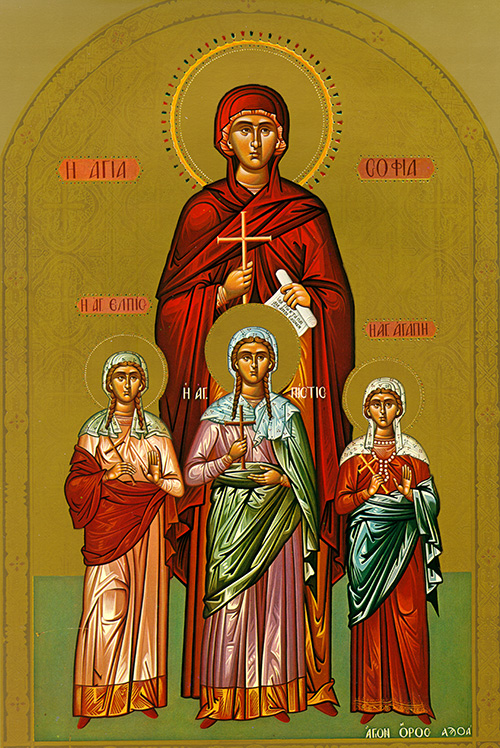

The holy martyrs St. Sophia [Wisdom], and her daughters Faith [Vera], Hope [Nadežda], and Charity [Luba] were born in Italy. Their mother was a pious Christian widow who named her daughters after the three Christian virtues. Faith was 12, Hope was 10, and Love was 9. St. Sophia raised them in the love of the Lord Jesus Christ. St. Sophia and her daughters did not hide their faith in Christ, but openly confessed it before everyone. They lived and suffered in Rome in the time of the emperor Hadrian. For refusing to sacrifice to the goddess Artemis, he had them put to death around the year 137.
Troparion
The Church solemnly celebrates and rejoices over the newly-born children and their radiant mother. Named for Wisdom and like her name, she gave birth to three children equal to the three theological virtues. In the company of these three wise virgins, she gazes on God the Word and Chaste Groom. We join her in her happiness spiritually and sing: O thrice-blessed martyrs, Faith, Hope, and Charity make us firm in faith, hope, and charity.
Kontakion
The three sacred branches of honorable Sophia, Faith and Hope and Charity, have shown forth. Through grace they outwitted the wisdom of the Greeks. Both through their suffering and through being bearers of victory, Christ, the Master of All, granted to them incorruptible crowns.
Epistle
Galatians 3: 15-22
Brothers and sisters, let me give you an everyday example of a promise not being nullified by the law. You cannot add anything to a man’s will or set it aside once it is legally validated. There were promises spoken to Abraham and to his “descendants.” Scripture does not say, “and to your descendants,” as if it applied to many, but as if it applied only to one, [as Scripture says], “and to your descendant”; that is, to Christ. My point is this: a covenant formally ratified by God is not set aside as invalid by any law that came into being four hundred and thirty years later, nor is its promise nullified. Clearly, if one’s inheritance comes through the law, it is no longer conferred in virtue of the promise. Yet it was by way of promise that God granted Abraham his privilege.
What is the relevance of the law, in such case? It was given in view of transgressions and promulgated by angels, at the hands of a mediator; it was to be valid only until that descendant or offspring came to whom the promise has been given. Now there can be no mediator when only one person is involved; and God is one. Does this mean that the law is opposed to the promises [of God]? Again, unthinkable! If the law that was given was such that it could impart life, then justice would be a consequence of the law. In fact, however, Scripture has locked all things in under the constraint of sin. Why? So that the promise might be fulfilled in those who believe, in consequence of faith in Jesus Christ.
Gospel
Mark 6: 7-13
At that time Jesus summoned the Twelve and began to send them out two by two, giving them authority over unclean spirits. He instructed them to take nothing on the journey but a walking stick–no food, not a coin in the purses in their belts. They were, however, to wear sandals. “Do not bring a second tunic,” he said, and added: “Whatever house you find yourself in, stay there until you leave the locality. If any place will not receive you or hear you, shake its dust from your feet in testimony against them as you leave.” With that they went off, preaching the need of repentance. They expelled many demons, anointed the sick with oil, and worked many cures.
Icon courtesy of Jack Figel, Eastern Christian Publications – ecpubs.com
Wednesday, September 17 –